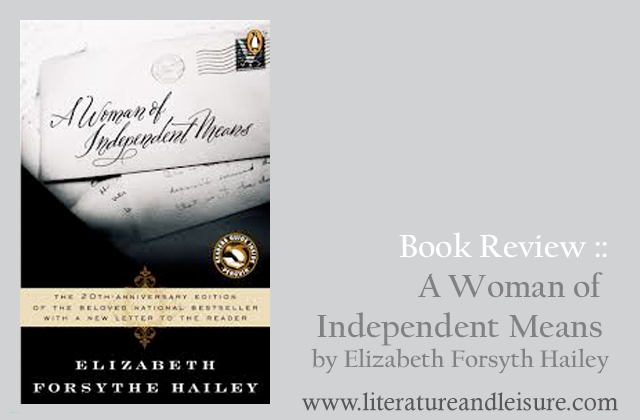I can’t remember when my book club has had such a spirited discussion as we did for A Woman of Independent Means by Elizabeth Forsythe Hailey. We are often guilty of talking over each other, but this time the energy and volume required calling us down. This is proof-postive of the book club-discussion-worthiness of this 1978 epistolary novel loosely based – as the author claims – on her grandmother.
The letters of Bess Steed Garner begin in 1899 when she’s in 4th grade, and from that very first communication the reader gets a clear idea of who Bess is: she’s accustomed to controlling things and stacking the deck in her favor. In this case, the letter is to Rob, her future boyfriend and husband: “I just asked Miss Appleton to put us on the same team for the spelling bee. Since we’re the only two people in the fourth grade who can spell ‘perspicacious,’ our team is sure to win.”
From there and in the next couple of pages – which span more than 10 years of her life – these characteristics expand to include her life of privilege, an expectation of seizing the most from what’s available, an insistence on helping to shape her husband’s career and creating for her husband a clear picture of the life they will have. This just serves to lay the foundation of more than 65 years of one-sided correspondence of a woman who admits her admiration of Lady Macbeth.
There is no doubt Bess is controlling and even manipulative in her means to get what she wants.
With her marriage, it’s a classic example of “be careful what you wish for.” She wants the wedding held in the parlor of her parent’s home so that Rob understand the life she expects. It isn’t too long into their marriage that he has not only met but exceeded them at the expense of traveling and a great deal of separation between them, which she also laments.
But it isn’t just her husband she exerts her control over: it is her children, her friends, her parents and other family members – it is everyone she comes into contact with, or at least anyone she writes letters to. (She gives instructions to the gardener at a hotel where she’s staying about pruning the periwinkle.)
This is what sparked such strong emotion and even outrage among my book group. Maybe she’s not very likable – but is she understandable? A Woman of Independent Means has been touted as a feminist novel, and some in our group took great exception to that. She’s a strong female with one significant asset – money. She uses that tool to garner influence in her alliances that she ultimately uses for her own good, but also the good of those she loves.
It is easy as a contemporary version of the strong female (a descriptor I’d use for every member of my book group) to be offended by Bess’ means of control. But is it unfair to judge Bess according to 21st century standards?
To appropriately judge her, I think the best we can do is take a look at how she was received when the book was first published. In its first review in The New York Times (written by none other than Anne Tyler), Tyler writes, “She operates by a combination of enthusiasm, nerve and stubborn refusal to be embarrassed by anything. If an event can possibly be altered by human intervention, she will see to it that it is.”
While not the most complimentary of descriptions, it is accepting of her humanity. Tyler acknowledges Bess’ nature but points out that while she sees herself as untouchable in her youth, in the end, she is absolutely touched by the things that impact us all: tragedy, death, loss, grief.
At a few points, this book is no fun at all to read. Why would we want to add this interfering, grasping, possessive person to our list of acquaintances? But slowly, she wins us over. Some of her more audacious offenses begin to make us laugh; her tragedies are more moving than we would have expected.
I agree with Tyler summation. “(W)e end up captivated.”
And as I reflect on this review, I see that I have not rectified another shortcoming of our book club’s discussion; so much time was spent on Bess herself, that very little was given to all the other things there are to discuss including marriage, friendship, courtship, societal constraints on women and a ton more. There’s no way for me to give all the time and space to what A Woman of Independent Means deserves.
So let me say this: I highly recommend A Woman of Independent Means – to read on your own or with others. And I’d love to know what you think of Bess.
P.S. – I first read A Woman of Independent Means last year in my quest to read more books that were published before I graduated high school, and obviously I was not disappointed. And, there’s a mini-series starring Sally Field that I’m really curious about. I can 100% see her as Bess.






Comments
Powered by Facebook Comments